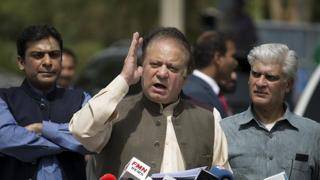"Creeping coup in Pakistan": Hindustan Times
Shares

Pakistan is oscillating between two diametrically opposed narratives. The Joint Investigation Team (JIT) appointed by the Supreme Court has presented in its report a damning indictment of overseas asset ownership of Prime Minister Nawaz Sharif and his immediate family.
Accountability of even the highest and that the fight against corruption must therefore begin from the top, forms one trajectory of discourse and argument. Not so, is the second trajectory.What is underway inside this camouflage of accountability and probity is a ‘creeping coup’ to engineer a regime change. Whether it succeeds or not is a different matter but, symptomatically this is, according to the perceptive former diplomat Afrasiyab Khattak for example, part of the “cycle of seven or eight years of Bonapartist intervention”.
Each of these two narratives is convincingly articulated and is internally consistent. For these arrayed against Sharif, holders of highest office must be even more accountable, the allegations of a witch hunt are preposterous and the judges and JIT officials are performing their role independently and objectively. But there are equally powerful arguments against.
A JIT into financial impropriety and undeclared assets having representation from military intelligence and the ISI is one. How a considerable volume of financial information, from within Pakistan and from third countries, spanning over three decades could be collected and converted into evidence in eight weeks is another.
The view that some — perhaps much — of this material are recycled versions of what emerged in similar exercises from the early 1990s has therefore a widespread currency. The present situation may have emerged from the independent revelations in 2016 of the Panama Papers but the substance of the allegations against many of Pakistan’s principal political families, including the Sharifs, are hardly new.
The fact that the issues or transactions under consideration date back to the nineties, and often earlier make the entire proceedings even more surrealistic. It would appear that Pakistan’s tangled history since the 1990s is itself being leapfrogged over. In the oscillatory patterns of Pakistan’s politics between generals Zia-ul-Haq and Pervez Musharraf, the corruption of civilian politicians dominated public discourse. Accountability was the instrument through which Musharraf split the Pakistan Muslim League after the 1998 coup and created a king’s party. Undeclared and colossal wealth is not a new development in Pakistan.
The JIT was created following a split 3-2 judgment of the supreme court. Two of the judges had called for the immediate disqualification of the prime minister basing their judgment on Articles 62 and 63 of the constitution. These articles are the residues of the violence General Zia had inflicted on the 1973 constitution. Article 62 provides for a prime minister who is ‘Sadiq’ (truthful) and 63 that he be ‘Ameen’ (righteous). In the minority judgment, Sharif passed neither test. The JIT report is now back with the supreme court, which has reserved its judgment but it can reasonably be expected in the coming weeks, if not days. - Hindustan Times